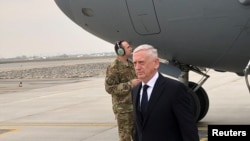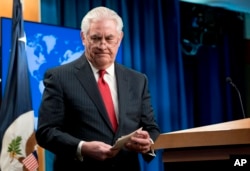Defense Secretary Jim Mattis said Thursday that Rex Tillerson's firing as U.S. secretary of state did not come up during his talks overseas this week, describing interest in the issue as largely a "Washington, D.C., story."
In his first public remarks on the matter since President Donald Trump announced Tillerson's dismissal Tuesday, Mattis, who had forged a close working relationship with Tillerson, said allies understood that ties with the United States were deeper than with any one individual.
"This issue has not even come up, other than with you all [in the media] — and I understand why you're asking," Mattis told reporters as he flew back to Washington from the Gulf nation of Bahrain. He had also traveled to Afghanistan since Tillerson's firing.
"But I'm just pointing out that in most parts of the world, this is a Washington, D.C., story."
Reuters has reported that differences over how to deal with North Korea's nuclear challenge were a key factor in Trump's decision to replace Tillerson as America's top diplomat. Trump nominated Mike Pompeo, director of the Central Intelligence Agency, to take the job.
Mattis had made no secret of his strong rapport with Tillerson, saying in January that the two had breakfast every week together and communicated frequently — sometimes two or three times a day.
The goal was to hammer out a consensus on key issues before addressing them to the White House.
"We settle all of our issues between he and I, and then we walk together into the White House meetings. That way, State and Defense are together," Mattis said at the time.
It was unclear whether Mattis, a retired Marine general, would be able to forge as strong a relationship with Pompeo.
Mattis declined to comment on when he learned of Tillerson's dismissal and did not offer any personal thoughts about it, other than to say it was not discussed in his past two days of conversations with Bahrain's leaders and NATO's envoy to Afghanistan and multiple town hall-style gatherings with U.S. troops.
"The durability of our relations with these countries, with the United States having very strong institutions, go beyond personalities," Mattis said.
Mattis suggested that cooperation with allies was unshaken by the dismissal.
"It's not about whether or not the United States is still an ally to the countries I've been in or the countries I've been talking to," Mattis said.
"I've signed letters while I've been out here, the normal coordination. ... The work goes on."






